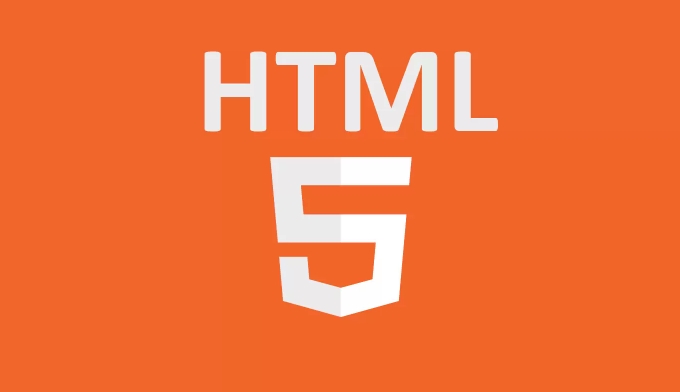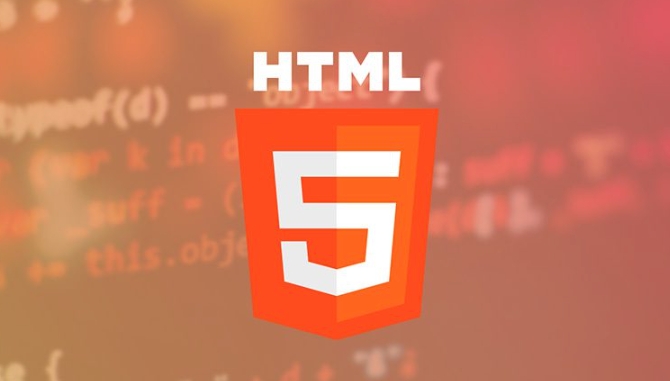HTML (HyperText Markup Language) is the standard language for creating and structuring web pages. It defines web page elements through tags and provides structure and meaning for content. 1. HTML is not a programming language and does not perform logic or calculations; 2. It serves as the skeleton of web pages, the basis for supporting styles (CSS) and interactions (JavaScript); 3. The correct use of HTML helps to improve website accessibility, SEO optimization and cross-browser compatibility; 4. Learning HTML only requires a text editor and browser, and the entry threshold is low; 5. Mastering HTML helps to deeply understand the operating principles of web pages and improve control over website layout and content.

HTML stands for HyperText Markup Language, and it's the standard language used to create and structure web pages. It's not a programming language — it doesn't "run" logic or calculations — but rather it gives structure and meaning to content on the web. Without HTML, a browser wouldn't know how to display text as paragraphs, headings, images, links, or any other type of content you see on websites.

The Basics: What Does HTML Do?
HTML works by using tags to define elements on a webpage. These tags tell browsers how to interpret and display content. For example:

-
<p></p>defines a paragraph -
<h1></h1>through<h6></h6>define different levels of headings -
<a></a>creates a hyperlink -
<img src="/static/imghw/default1.png" data-src="https://img.php.cn/upload/article/000/000/000/175217285630671.jpeg" class="lazy" alt="What is HTML and why is it important?" >embeds an image
These elements combine to form the basic structure of any website. Think of HTML as the skeleton of a webpage — without it, there's no foundation for style (CSS) or interaction (JavaScript).
Why HTML Matters for Web Development
Even with all the modern tools and frameworks out there, HTML remains essential because it powers the core structure of every site. Here's why that matters:

- Accessibility : Proper use of HTML helps make websites accessible to screen readers and other assistive technologies.
- SEO-Friendly Content : Search engines rely heavily on HTML tags like
<title></title>,<meta>, and heading structures to understand and rank pages. - Cross-Browser Compatibility : Well-written HTML ensures your content displays consistently across different browsers and devices.
If you're building a website — whether you're coding from scratch or using a CMS like WordPress — understanding HTML gives you more control over layout, formatting, and how content is interpreted by machines.
You Don't Need Much to Get Started With HTML
One of the great things about HTML is that it's beginner-friendly. All you need is a text editor (like Notepad or VS Code) and a browser to preview your work. There's no complicated setup or installation required.
Here's a very simple HTML example to try yourself:
<!DOCTYPE html>
<html>
<head>
<title>My First Page</title>
</head>
<body>
<h1>Hello, world!</h1>
<p>This is my first HTML page.</p>
</body>
</html> Just save that as index.html and open it in a browser. You'll see a basic webpage with a heading and a paragraph. From there, you can start experimenting with lists, links, images, and more.
Learning HTML opens the door to understanding how the web works at a fundamental level. It's not flashy or complex, but it's absolutely necessary for anyone interested in web development, design, or even just tweaking their own blog.
The above is the detailed content of What is HTML and why is it important?. For more information, please follow other related articles on the PHP Chinese website!

Hot AI Tools

Undress AI Tool
Undress images for free

Undresser.AI Undress
AI-powered app for creating realistic nude photos

AI Clothes Remover
Online AI tool for removing clothes from photos.

Clothoff.io
AI clothes remover

Video Face Swap
Swap faces in any video effortlessly with our completely free AI face swap tool!

Hot Article

Hot Tools

Notepad++7.3.1
Easy-to-use and free code editor

SublimeText3 Chinese version
Chinese version, very easy to use

Zend Studio 13.0.1
Powerful PHP integrated development environment

Dreamweaver CS6
Visual web development tools

SublimeText3 Mac version
God-level code editing software (SublimeText3)

Hot Topics
 Explain the purpose of the role attribute in ARIA.
Jun 14, 2025 am 12:35 AM
Explain the purpose of the role attribute in ARIA.
Jun 14, 2025 am 12:35 AM
ARIA's role attribute is used to define the role of web elements and improve accessibility. 1. Role attribute helps assistive technology to understand the functions of elements, such as buttons, navigation, etc. 2. Use role attributes to assign specific roles to non-semantic HTML elements. 3. The role attribute should be consistent with the element behavior and be verified by the accessibility tool test.
 HTML and Design: Creating the Visual Layout of Websites
Jun 14, 2025 am 12:39 AM
HTML and Design: Creating the Visual Layout of Websites
Jun 14, 2025 am 12:39 AM
How to create a website layout? 1. Use HTML tags to define the content structure, such as, ,. 2. Control styles and positions through CSS, using box model, float or Flexbox layout. 3. Optimize performance, reduce HTTP requests, use cache and optimize images, and ensure responsive design.
 How do I stay up-to-date with the latest HTML standards and best practices?
Jun 20, 2025 am 08:33 AM
How do I stay up-to-date with the latest HTML standards and best practices?
Jun 20, 2025 am 08:33 AM
The key to keep up with HTML standards and best practices is to do it intentionally rather than follow it blindly. First, follow the summary or update logs of official sources such as WHATWG and W3C, understand new tags (such as) and attributes, and use them as references to solve difficult problems; second, subscribe to trusted web development newsletters and blogs, spend 10-15 minutes a week to browse updates, focus on actual use cases rather than just collecting articles; second, use developer tools and linters such as HTMLHint to optimize the code structure through instant feedback; finally, interact with the developer community, share experiences and learn other people's practical skills, so as to continuously improve HTML skills.
 How do I use the element to represent the main content of a document?
Jun 19, 2025 pm 11:09 PM
How do I use the element to represent the main content of a document?
Jun 19, 2025 pm 11:09 PM
The reason for using tags is to improve the semantic structure and accessibility of web pages, make it easier for screen readers and search engines to understand page content, and allow users to quickly jump to core content. Here are the key points: 1. Each page should contain only one element; 2. It should not include content that is repeated across pages (such as sidebars or footers); 3. It can be used in conjunction with ARIA properties to enhance accessibility. Usually located after and before, it is used to wrap unique page content, such as articles, forms or product details, and should be avoided in, or in; to improve accessibility, aria-labeledby or aria-label can be used to clearly identify parts.
 How do I create a basic HTML document?
Jun 19, 2025 pm 11:01 PM
How do I create a basic HTML document?
Jun 19, 2025 pm 11:01 PM
To create a basic HTML document, you first need to understand its basic structure and write code in a standard format. 1. Use the declaration document type at the beginning; 2. Use the tag to wrap the entire content; 3. Include and two main parts in it, which are used to store metadata such as titles, style sheet links, etc., and include user-visible content such as titles, paragraphs, pictures and links; 4. Save the file in .html format and open the viewing effect in the browser; 5. Then you can gradually add more elements to enrich the page content. Follow these steps to quickly build a basic web page.
 How do I create checkboxes in HTML using the element?
Jun 19, 2025 pm 11:41 PM
How do I create checkboxes in HTML using the element?
Jun 19, 2025 pm 11:41 PM
To create an HTML checkbox, use the type attribute to set the element of the checkbox. 1. The basic structure includes id, name and label tags to ensure that clicking text can switch options; 2. Multiple related check boxes should use the same name but different values, and wrap them with fieldset to improve accessibility; 3. Hide native controls when customizing styles and use CSS to design alternative elements while maintaining the complete functions; 4. Ensure availability, pair labels, support keyboard navigation, and avoid relying on only visual prompts. The above steps can help developers correctly implement checkbox components that have both functional and aesthetics.
 What is an HTML tag?
Jun 13, 2025 am 12:36 AM
What is an HTML tag?
Jun 13, 2025 am 12:36 AM
HTMLtagsareessentialforstructuringwebpages.Theydefinecontentandlayoutusinganglebrackets,ofteninpairslikeand,withsomebeingself-closinglike.HTMLtagsarecrucialforcreatingstructured,accessible,andSEO-friendlywebpages.
 How do I minimize the size of HTML files?
Jun 24, 2025 am 12:53 AM
How do I minimize the size of HTML files?
Jun 24, 2025 am 12:53 AM
To reduce the size of HTML files, you need to clean up redundant code, compress content, and optimize structure. 1. Delete unused tags, comments and extra blanks to reduce volume; 2. Move inline CSS and JavaScript to external files and merge multiple scripts or style blocks; 3. Simplify label syntax without affecting parsing, such as omitting optional closed tags or using short attributes; 4. After cleaning, enable server-side compression technologies such as Gzip or Brotli to further reduce the transmission volume. These steps can significantly improve page loading performance without sacrificing functionality.






